转型与探索:第30届欧洲乡村社会学大会观察与纪要
马惠娣(2025年8月2日)
每两年一届的欧洲乡村社会学大会于7月7-11日在拉脱维亚首都里加举行,这是第30届会议,至今持续六十年。其基本理念:“去增长、少消费、更自然”。
本次会议由Rīga Stradiņš University承办,多国学者组成大会科学委员会。主题是:“引领乡村转型:探索宜居未来”(Navigating rural transitions: Exploring liveable futures),吸引四百余人出席大会,包括专业性的和跨学科的。大会邀请了三位著名学者做了大会报告,对气候变化与不确定性未来的乡村转型做了深刻分析和具有远见卓识的预警,以及对学者社会责任的期待。
大会开幕式的前奏(社交)在前一天晚上的里加古城有着一千余年历史的DOME修道院举行,新朋旧友在此相聚。当地组委会以拉脱维亚人传统的待客形式——伴着悠扬的手风琴乐曲和穿着民族服饰的年轻女子,翩翩起舞。热情地邀客人们共舞。因为当时下着雨,这些活动不得不由修道院中心草坪改为在廊道内。但并未影响整个活动呈现的简洁而热烈、浪漫与轻松、自然又友好的气氛。
大会的基本理念:在当今世界充满挑战的背景下,引领乡村转型,探索宜居乡村的未来,正面临一系列多元化的挑战,同时也具有可能性——实现所有人共享的公正、可持续且“值得生活”的未来;勉强维持生计甚至灾难性的未来;介于两者之间的所有情境的未来。这些未来的可能性,需要学者们参与批判性的社会政治与社会生态议题讨论,当然,也不仅仅限于此。
同样有些议题十分重要,诸如:农业与粮食系统,正义与歧视,知识政治,社会动员与能动性,移民与流动性,技术、联结与团结,关怀与希望。此外,还需关注(地方)民主、集体行动的重要性,以及在乡村地区发展相对自主的组织形式(如乡村公共资源)。
探讨这些议题意味着既要关注当下人们的实际生活经验与实践,也要考量人们的愿景与期待。这要求我们运用、质疑并发展新的理论与方法,同时就研究者的角色及所需采取的行动展开讨论。
在持续的不确定性及多重交织的“危机”中,如何确保宜居乡村的未来,尤其关注那些能被剖析并参与实现宜居乡村未来过程中不同动态、实践、张力、矛盾与复杂关联的问题尤为重要。
围绕“引领乡村转型:探索宜居未来”这一主题,大会设有三十九个分议题:
1、基于价值的替代性食物体系:认证之外的质量保障与可持续实践
2、土地改革与社区共有土地:构建宜居未来的路径
3、代际更迭、可持续农业与乡村未来
4、农业中生活与工作的交集:探索如何创造宜居的"当下"与未来
5、游戏化乡村宜居未来:研究与教育中的游戏设计
6、乡村能否成为新的创意中心?基于地域的文化创新与变革力量
7、乡村验证:是多元意义的否定还是地方化政策制定的希望工具?
8、从粮食之乡到碳汇之地——农业生计与气候解决方案市场的张力
9、乡村绅士化的多元形态
10、我们为何教授乡村社会学?其目的何在?
11、转型期乡村地域中森林与林业的角色
12、转型期乡村空间的社会参与和行动主义
13、乡村社区重焕联结活力的路径
14、构建依赖水资源的转型期乡村社区的宜居未来
15、乡村地区食物自给与技能:家庭与社区层面的韧性启示
16、研究乡村地区社会-生态转型的社会维度
17、“独辟蹊径”(Queering)视角下的农业与乡村性
18、回到未来?乡村生物经济与农业食品未来
19、重构南欧乡村空间转型:生计机遇与日常生活
20、生物区域战略:寻求社会、经济与环境未来平衡的宜居乡村
21、知识经济与文化十字路口:移民与欧洲乡村的转型
22、数字基础设施能否铺就农业宜居未来?
23、农业领土化前沿:经济可行性、社会生态可持续性与食物系统未来
24、量化环境:社会与自然关系的重塑
25、性别平等与农业及乡村未来的宜居性
26、乡村住房危机还是危机中的乡村住房?国际视野下的当前挑战
27、岛屿的本位研究:发展宜居岛未来的研究方法
28、技术与数字化的乡村未来
29、构建宜居乡村未来:社会气候正义视角下的社会团结经济
30、融合公共领域与政策制定:运用社会学知识创造宜居未来?
31、动荡的当下与不确定未来:如何探索并驾驭农业食品系统与乡村转型
32、乡村语境下包容性研究实践的反思
33、地域层面生态农业转型:方向、僵局与迂回之路
34、农场转型:多样化、绿色化及其他社会经济可持续路径
35、乡村转型的政治维度:探索城乡分化的政治化及其对欧洲社会影响
36、压力下的艺术与文化:如何面对乡村宜居未来的角色?
37、后疫情时代的乡村人口变化与挑战:复兴、韧性还是倒退?
38、作为创新生态系统的乡村地区:变革性战略与社会创新
39、乡村老龄化:老年乡村生活的挑战与机遇
这些议题意味深远:关注现实:既要看到当下人的生活实践,也要倾听他们对未来的渴望;理论创新:需要理论的批判性,既要检验已有的范式,也要探索乡村复杂性的新方法论;之于学者的责任:需重新界定研究者角色,厘清学术介入与社会行动边界的相互关系。这些议题与乡村经验对非欧洲国家带来重要的启示。
会议举办包括多种形式,诸如:学术报告、圆桌讨论、音视频材料、现场表演(音乐、戏剧、诗歌)、摄影或艺术展览、图书发布等环节。
会议期间,大会还组织了不同线路的城乡考察项目。笔者参加了里加世界文化遗产之一“中央市场”。这是德国侵占拉脱维亚战败后,政府利用当年制造武器的五个高大建筑,变为让城市充满“接地气”、“烟火气”的城市生活聚集地,如今已百年有余。这里不仅与拉脱维亚人日常生活息息相关,也带动了城乡一体化的发展,并辐射到周边国家。既有充满人文关怀的生活情趣,也带动城乡经济发展和就业。
据大会的统计,参加欧洲乡村社会学协会的会员数量,第一位是英国、第二位是德国、第三位是荷兰。这一统计数据耐人寻味。
其中会议分议题:“乡村地区食物自给与技能:家庭与社区层面的韧性启示”一组的投稿人和听会人格外多,讨论也很热烈。一方面表达了对“去增长、少消费、更自然”价值理念的追求;另一方面也看到欧洲人面对不确定性所做出前瞻性的预警。
大会还选举了新的一届理事会,报告了过去两年协会的会员增长、财务收支等情况。
笔者,参加了两个组别的讨论,分别提交了:Home Gardening: Resilience, Dilemmas, and the Promise of Alternative Food Systems的论文;另一篇关注了:Nurturing a Sound Personality and Rural Vitality in Ecological Games (Education)(附摘要于后)

(Rīga Stradiņš University座落于绿色植被和大树的环境之中)

The newly elected Executive Board of the European Association of Rural Sociologists. Miķelis Grīviņš - first from left
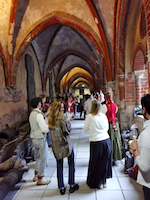 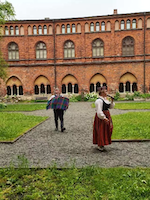 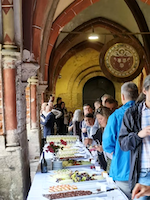
(修道院社交画面)
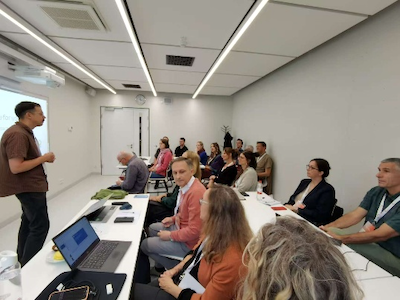
(专题讨论组现场)

(中央市场外景)
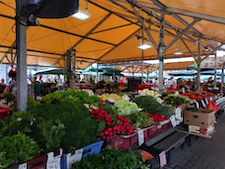 
(中央市场的蔬果味道纯正。据悉政府有严格的食品源头监察体系,确保食物的品质。)

(ESRS2025大会官方LOGO)
附摘要(1)
"Being Flatted", the Phenomenon Among Chinese Farmers, its Potential Risks and Lessons
——The urgency to regain values of food-self provisioning
Huidi Ma Fangliang Wang
Abstract
The phenomenon of "Being Flatted" refers to Chinese farmers’ land being taken for reclamation and urban development (Ministry of Land and Resources, 2008), forcing them to move out of their ancestral estates into high-rise buildings. Its consequences: the local governments’ expropriation of arable lands for property development has left villagers unable to grow food in the fields or yards, and their cost-of-living increase (Chen Xiwen, 2011). In allusion to this phenomenon, the article focuses on the working and living conditions of approximately 200 million rural residents who have gone into town over the past decade. By examining the status quo of their allotments, urban living costs, food sources, and food reserves, we uncover the longstanding trend of rural hollowing. It would be like hidden potential risks: there’s no one to hand over the farming skills, and old wisdoms are irretrievably lost. Meanwhile, the spirits of law, fairness and justice are being challenged; a new underprivileged class emerge; and social conflicts rise. Our conclusion: the inconsistent rural policies have left villagers with broken hopes; They “enter with city optimism but leave in despair”. The loss of allotment means heavier burden in domestic life, the decline of folk agricultural techniques, and lower resilience to food shortages. These add to the uncertainty of outlook, striking a deathblow to families or even the entire country. For now, the top priority should be to turn our vision from the commercial system to the value of food-self provisioning in rural life.
Key Words: "Being Flatted”, loss of allotment, rural hollowing, potential risks, lessons
附摘要(2)
Nurturing a Sound Personality and Rural Vitality in Ecological Games (Education)
Huidi Ma
Abstract:The natural attributes of rural endow ecological education in serious games with endless imagination and creativity. Currently, various projects in China focused on youth natural education (such as planting, animals, plants, microorganisms, geography, phenology, etc.) are flourishing. Across different regions, a diverse range of "natural value" (Holmes Rolston) curricula have emerged, enabling youth to explore the interconnectedness of human, nature, the earth and others through activities that foster both sound personality development and rural vitality.
This paper uses the NGO of "Friends of Nature" as a case study to investigate the motivations, preferences, and interests cultivated in the participants of those serious games. It examines the roles they play in " state of being " and " socialization" (John R. Kelly), as well as their attitudes towards social care. The study aims to construct a "Serious Games Model " to analyze the complex dynamic relationships among human, natural ecology and social ecology. It tracks and assesses the correlation, effectiveness, and limitations of interrelated transformations, and predicts and the potential of serious games to counteract the encroachment of AI technology on human nature. Additionally, it explores social practices rooted in the cultural heritage of rural ecology.
The research concludes that serious games contribute to enhancing the vitality and livability of rural environments, promoting urban-rural integration. Against the background of today's deeply technologized human life, boldly innovating serious games in rural areas can both repair human nature and cultivate "technological virtues" (Shannon Vallor). In summary, humans bear responsibilities to uphold the natural attributes of both rural environments and themselves.
【Keywords】Rural vitality , Ecological education, Sound personality, Technological virtues
|

